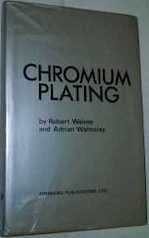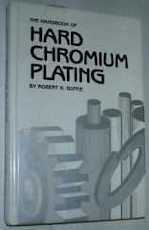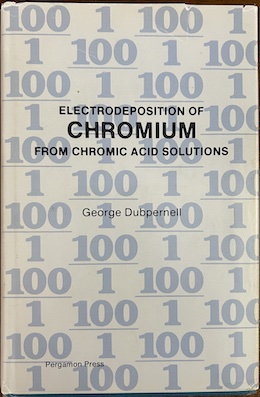
Curated with aloha by
Ted Mooney, P.E. RET

The authoritative public forum
for Metal Finishing 1989-2025

-----
Chrome plating chemistry lesson
Q. I've read some of your threads and understand the reasons for not doing chrome plating as a school project. But I would like to understand more about the chemistry of chrome plating (the information from text book is very scanty). Could you give me some information on that (I've searched the internet but I'm getting a lot of commercial stuff instead).
Thank you,
- Alor Star, Kedah, Malaysia
2003
by Weiner & Walmsley

on AbeBooks
(rarely)
or eBay
(sometimes)
or Amazon
(sometimes)
(affil links)
by Robert K. Guffie

on AbeBooks
(rarely)
or eBay
(rarely)
or Amazon
(affil links)
by George Dubpernell"

on AbeBooks
or eBay or
Amazon
(affil links)
A. Hello Cheah. We appreciate your interest.
Chromium is an element and 'chrome' is a slang word for it. Chrome plating is the electrolytic deposition of chromium from an aqueous solution containing (usually) Chromic Acid (H2Cr04) and a "catalyst", usually sulfuric acid.
The exact steps in the deposition process (i.e., all the intermediate species of ions and compounds) have been the subject of large and deep research projects that are beyond my understanding or that of most high school students. But if we look at just the beginning and the end, rather than trying to understand every intermediate state, the situation is that we start with chrome ions in solution in a Cr+6 state as chromic acid, and we end up with Cr+0 metal -- and the driving force towards this is a DC current source which supplies 6 electrons to the workpiece for each atom of chrome to be deposited on it. However, chrome plating is exceptionally inefficient (much less efficient than most other plating processes). It's usually only about 12-15 percent efficient, which means that only 12-15 percent of the electricity supplied is actually applied towards reducing hexavalent chromium ions to chromium metal. The other 85-88 percent is 'wasted' in separating water molecules into hydrogen and oxygen.
You may be interested in our FAQ, "Introduction to Chrome Plating". Further, while your text book may not have much information on chrome plating, your library might. I have 3 books just about chrome plating.
and most plating books will have a chapter on chrome plating. Best of luck.

Ted Mooney, P.E.
Striving to live Aloha
finishing.com - Pine Beach, New Jersey
2003
A. Chrome plating generates a huge amount of heat, so probably half of the wasted electricity goes into heat rather than gas. Some chrome plating processes add a "catalyst" which very probably is not a true catalyst. I think that it has a higher efficiency by raising the hydrogen and the oxygen overvoltage potential which means that less gas is formed. Big trade secret as to how and why it works!
James Watts- Navarre, Florida
2003
Q. I just wondered why if chrome-plating is so inefficient, why is it not possible to start the plating process using the stable trivalent chromium, rather than hexavalent chromium, since the chromium ions will reach the +3 state during the reduction anyway? Surely this will save some energy during the reaction?
James McBridie- Sheffield, Yorkshire, England
December 22, 2014
A. Hi James. Yes, it is possible to do chrome plating from a trivalent rather than hexavalent bath, and it is widely practiced for decorative nickel-chrome plating. But plating from a trivalent chromium bath is not easy either, introduces its own problems, and requires special proprietary chemistry, special anodes, and in some approaches, membranes to separate the anode ions from the cathode ions.
If you use the search engine to look for "trivalent chrome plating", you will find a bunch of threads on the subject.
Trivalent chromium and hexavalent chromium are also both used in processes for chromate conversion coating/passivation of aluminum and zinc plated components so, to reduce confusion as you review the threads, skip those that don't relate directly to chrome plating. Good luck.
Regards,

Ted Mooney, P.E.
Striving to live Aloha
finishing.com - Pine Beach, New Jersey
December 2014
Q, A, or Comment on THIS thread -or- Start a NEW Thread